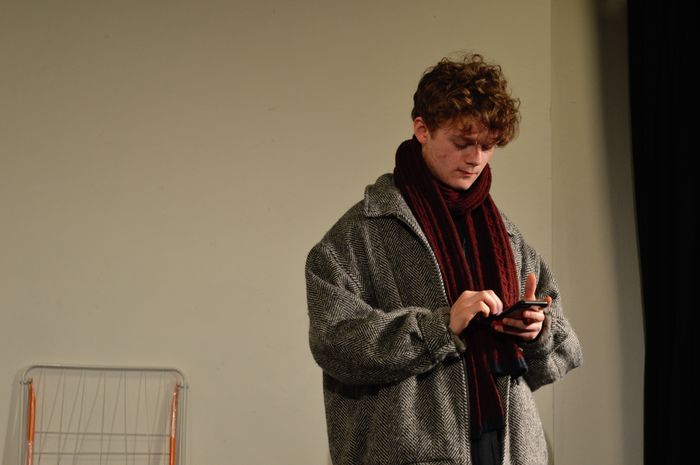Who’s watching who in CTRL-Z?
This pertinent, sensitive exploration of privacy in the digital age leaves Sam Rogers deep in thought and thoroughly entertained

The difficulty inherent in putting on anything as zeitgeist-y as CTRL-Z is managing to say something original in an oversaturated conversation. For a subject like digital privacy, discussed in too many podcasts and think-pieces and dinner table conversations to count, the balancing act of avoiding cliché while still saying something important becomes a tightrope walk. The highest praise I can give to Izzy Collie-Cousins and her cast is that they pull it off.
George Newson-Errey’s new script follows the interwoven stories of the Society for Virtual Oblivion, a disparate group of people who are trying to completely erase themselves and their data from the internet, and two older local historians researching the church where the Society meets. It is an intriguing setup: the right to privacy explored through a group of people trying to erase what cannot be forgotten, and the right to be forgotten explored through a pair of archaeologists seeking to rediscover the hidden.
"a fresh and intriguing look at the right to remember and the right to be forgotten"
The stained-glass windows and larger-than-life religious figures of this church serve as the backdrop for the entirety of the play, dominating the stage. It is a visually compelling set which touches upon the key tensions of the play – the old and the new, religion and the virtual world – but it seriously limits the already modest space available in the Playroom, which leaves some scenes suffering slightly from a lack of movement.
The scenes in the Society are brought to life by an assured collection of performances, creating a convincing image of a group of people who are neither friends nor strangers, sharing little but preferring coexistence to complete isolation. Rory Russell and Lydia Makrides as the historians have an understated chemistry which befits these two very settled characters, as a counterpoint to the members of the Society, who are all in the midst of some kind of inner turmoil.
The two primary storylines are interspersed by the appearances of The Algorithm (Ferdinand Holley), who serves both as Greek chorus and all-seeing eye. Holley’s performance is remarkably controlled, simultaneously robotic and serpentine, and his monologues, backed by the subtle but effective green lighting, with a single flickering bulb overhead, have a distinctly ethereal quality which runs as an undercurrent throughout the entire play.
"a world in which to exist is to be watched, and to be forgotten is a pipe dream"
The parallels drawn by Newson-Errey between ancient religious hermits and those trying to remove their online presence, as well as the embodiment of the virtual world as this quasi-divine figure of The Algorithm, give useful context to the questions about privacy and surveillance which the play tackles. We are not the first to feel watched, nor are we the first to try to hide ourselves. The fourth-wall breaking which traps the characters between an all-seeing audience on one side, and the overbearing religious imagery on the other, is an inspired choice which brings a real urgency to the characters’ paranoia.
However, the attention given to these thematic motivations sometimes detract from the humanity of the characters themselves, with some scenes straying dangerously close to unmediated exposition. This is always the danger of a play like this, and it should be mentioned that the performers do well to avoid melodrama, with the moments of comic levity consistently landing.
Though its shortcomings should not be ignored, this cohesive production is ultimately successful in providing a fresh and intriguing look at the right to remember and the right to be forgotten – a bold script carried confidently by an impressive ensemble. It is a personal yet universal look at how one should respond to a world in which to exist is to be watched, and to be forgotten is a pipe dream. Expect to be entertained by CTRL-Z, but expect to be challenged as well.
CRTL-Z is on at the Corpus Playroom from 21st to 25th January.
 Features / Cloudbusting: happy 10th birthday to the building you’ve never heard of30 March 2025
Features / Cloudbusting: happy 10th birthday to the building you’ve never heard of30 March 2025 News / Uni offers AI course for Lloyds employees30 March 2025
News / Uni offers AI course for Lloyds employees30 March 2025 News / Caius clock hand returned nearly 100 years after student prank31 March 2025
News / Caius clock hand returned nearly 100 years after student prank31 March 2025 News / Cambridge University Press criticises Meta’s ‘dismaying’ use of copyrighted material28 March 2025
News / Cambridge University Press criticises Meta’s ‘dismaying’ use of copyrighted material28 March 2025 News / Ski mask-wearing teens break into Caius accommodation27 March 2025
News / Ski mask-wearing teens break into Caius accommodation27 March 2025






